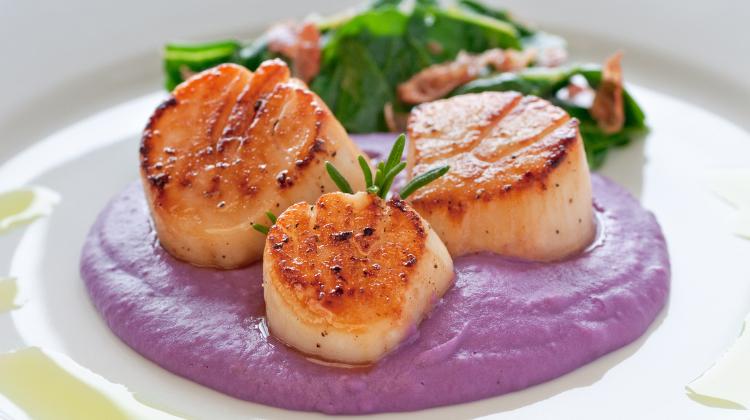Can You Eat Scallops While Pregnant? Benefits & Is It Safe 2024?

Pregnancy often comes with a lot of confusion, especially regarding what you can and cannot eat. Of course, you want to do the right thing for your child, but there are so many RULES regarding what pregnant women can eat, which can quickly get overwhelming.
So, can you eat scallops while pregnant? Read on to find out these answers as well as what foods to avoid during pregnancy.
Consuming seafood while pregnant has gotten a negative rap in the past years primarily due to the high mercury content of fish. Per Mayo Clinic[1], mercury can build up in a pregnant woman’s bloodstream. If too much mercury is continuously in the blood, it can harm a growing baby, causing problems in the brain and nervous symptom development.
Because of this, most pregnant women have become overcautious, avoiding all seafood in their diet. However, modern research shows consumption of 8 to 12 ounces of low mercury fish per week helps with fetal growth and development.
Can I Eat Scallops While Pregnant?
Even though there is a lot of confusion about what pregnant women can eat, there is no confusion regarding sea scallops or bay scallops.
They are rich in lean protein and omega 3-fatty acids, which are powerful antioxidants. They are also loaded with trace minerals[2] which most people, unfortunately, do not get enough of.
Crucial to thyroid health, iodine in seafood is a valuable bonus. This also answers the question, of whether you can eat shellfish while pregnant as scallops are part of the shellfish category when it comes to seafood.
Eating scallops isn’t the only way to maintain a healthy diet while pregnant. According to the Food and Drug Administration, there are many nutrient-rich fish with low mercury content[3] you can consume while pregnant. These include salmon, shrimp, crawfish, and tuna (albacore/ white tuna, canned and fresh/frozen–though not bigeye).
Of course, there is some seafood a pregnant woman should avoid. This includes any raw seafood, including sushi that contains raw fish. This type of fish can harbor harmful bacteria or viruses, which can hurt your unborn baby’s growth or cause foodborne illnesses.
Other seafood to avoid while pregnant include fish that are high in mercury[4]. These fish include; king mackerel, swordfish, shark, and orange roughy.
Benefits of Eating Scallops During Pregnancy
Eating fish while pregnant has been researched by The European Food Safety Authority[5] (ESFA), World Health Organization[6] (WHO), and the Food and Drug Administration(FDA)[7]. They have found improved brain development in babies whose mothers consumed fish while pregnant.
Their research has shown women who consume 8-12 ounces of seafood weekly (or two to three servings weekly) have babies with improved IQ, improved brain development, and overall higher total scores for verbal, motor, memory, and overall cognitive development as compared to babies of mothers who had no consumption of seafood.
Other benefits of including fish in a pregnant woman’s diet are an increase in lean protein, omega-3 fats, and vitamin B-12 and vitamin D. Seafood also contains iron and trace minerals such as selenium, zinc, and iodine. All of these nutrients are especially important when you are growing a child.
This is because the volume of blood in your body increases with pregnancy, as does the amount of nutrients and iron you need because of the double effect of increased volume and dilution of nutrients due to that increased volume.
Therefore, the more blood your body makes, the more nutrients your body needs to be able to maintain normal physiology for supplying enough oxygen and nutrition to your baby.
If you don’t have enough nutrient stores, for example, iron or folic acid, you could develop anemia[8]. Symptoms of being anemic include fatigue and tiredness. More scary however is if untreated, anemia can result in some really bad complications like premature delivery and uncompensated blood loss.
So now we know that consuming seafood is a healthy part of a pregnant woman’s diet, but how much seafood can you eat while pregnant?
The Food and Drug Administration (FDA)[9], the Environmental Protection Agency (EPA)[10], and the 2020-2025 Dietary Guidelines for Americans[11] all collectively suggest that women eat two to three servings of low mercury seafood weekly. If you are curious, this is around 340 grams or up to 12 ounces weekly.
How to Cook Scallops Safely at Home
There are two different types of scallops:
- Bay scallops: This type of scallop tends to be small and is typically found in shallow waters
- Sea scallops: This type of scallop is larger with more “meat” and is found in deep ocean water
You can also choose between fresh or frozen scallops. Fresh scallops aren’t necessarily a healthier choice than frozen scallops. What matters is the smell. If they have a funny or fishy smell, it’s best to put them back.
The fishy smell could mean they haven’t been appropriately refrigerated after being caught and could cause foodborne illnesses if consumed. Instead, they should smell slightly sweet.
Be sure to consume fresh scallops the day you purchase them, if possible since they are perishable and can potentially cause food poisoning if left out for too long. If you are using frozen scallops, they can keep in the freezer for up to three months. Once you are ready to start prepping your scallops, be sure to clean them with cold running water, then pat them dry before cooking.
Pan-searing is potentially the most popular way of cooking scallops; however, with pan-searing, you only cook the scallops for approximately 2 minutes. This means they aren’t entirely cooked properly; thus, the scallop’s inside remained raw. And by now, you know raw seafood means terrible things for your sweet unborn baby.
Rather than pan-sear, try to enjoy scallops on the grill, bake them in the oven, or even use the air fryer! This technique will ensure proper cooking, but you’ll have to be creative so they won’t turn rubbery.
To the United States Department of Agriculture, use a food thermometer and make sure the internal temperature of the scallop is 145 degrees to ensure it’s adequately cooked, for food safety.
Precautions
There are still a few things to keep in mind regarding seafood and maternal health. First, be aware of an allergic reaction. Scallops are in the shellfish category when it comes to allergies, and shellfish allergies can present even during adulthood.
Typically the first sign that you’ve ingested a food to which you are allergic is a tingling of your mouth and tongue. An allergic reaction can occur within minutes but is typically seen within 48 hours of eating the allergen.
Other symptoms of a reaction include
- Itching
- Hives
- Rashes
- Redness around the mouth
- Swelling
Also, be aware of the symptoms possible from ingesting raw seafood. Some undercooked or ill-prepared seafood symptoms include stomach cramps, nausea, vomiting, upset stomach, and diarrhea.
Symptoms of extreme food poisoning[12] include
- Muscle Pain
- Vertigo
- Irregular heart rhythms
- Low blood pressure
The Bottom Line
So, can you eat seafood while pregnant? Turns out that consuming scallops is an excellent addition to a pregnant woman’s diet. They are high in protein, omega-3 fatty acids, and several trace minerals such as iodine, magnesium, selenium, zinc, and copper. The only thing to be aware of is that you must prepare and cook the scallops properly.
Pregnant women should not eat raw seafood, including raw scallops. If you decide to skip the scallops altogether while pregnant, consider replacing them with another low mercury fish such as salmon or shrimp (while cooking to an appropriate internal temperature of 145 degrees), as seafood has been shown to improve brain development in unborn babies. Alternatively, oysters, like scallops, are mollusks, too–seafood with all of the same benefits.
+ 12 sources
Health Canal avoids using tertiary references. We have strict sourcing guidelines and rely on peer-reviewed studies, academic researches from medical associations and institutions. To ensure the accuracy of articles in Health Canal, you can read more about the editorial process here
- Mayo Clinic. (2021). Pregnancy and fish: What’s safe to eat? [online] Available at: https://www.mayoclinic.org/healthy-lifestyle/pregnancy-week-by-week/in-depth/pregnancy-and-fish/art-20044185#:~:text=If%20you%20regularly%20eat%20fish,developing%20brain%20and%20nervous%20system.
- Schomburg, L. (2016). Dietary Selenium and Human Health. Nutrients, [online] 9(1), p.22. doi:10.3390/nu9010022.
- ADVICE ABOUT EATING FISH. (n.d.). [online] Available at: https://www.fda.gov/media/102331/download.
- Center (2022). Advice About Eating Fish. [online] U.S. Food and Drug Administration. Available at: https://www.fda.gov/food/consumers/advice-about-eating-fish
- Scientific Opinion on health benefits of seafood (fish and shellfish) consumption in relation to health risks associated with exposure to methylmercury. (2014). EFSA Journal, [online] 12(7), p.3761. doi:10.2903/j.efsa.2014.3761.
- Rome (2010). FAO Fisheries and Aquaculture Report No. 978 FIPM/R978(En) Report of the JOINT FAO/WHO EXPERT CONSULTATION ON THE RISKS AND BENEFITS OF FISH CONSUMPTION. [online] Available at: https://www.fao.org/3/ba0136e/ba0136e00.pdf
- Center (2022). Advice About Eating Fish. [online] U.S. Food and Drug Administration. Available at: https://www.fda.gov/food/consumers/advice-about-eating-fish
- Mayo Clinic. (2022). Prevent iron deficiency anemia during pregnancy. [online] Available at: https://www.mayoclinic.org/healthy-lifestyle/pregnancy-week-by-week/in-depth/anemia-during-pregnancy/art-20114455
- Center (2022). Advice About Eating Fish. [online] U.S. Food and Drug Administration. Available at: https://www.fda.gov/food/consumers/advice-about-eating-fish
- US EPA. (2015). EPA-FDA Advice about Eating Fish and Shellfish | US EPA. [online] Available at: https://www.epa.gov/fish-tech/epa-fda-advice-about-eating-fish-and-shellfish
- USDA (2020). Dietary Guidelines for Americans 2020 -2025 Make Every Bite Count With the Dietary Guidelines. [online] Available at: https://www.dietaryguidelines.gov/sites/default/files/2020-12/Dietary_Guidelines_for_Americans_2020-2025.pdf.
- Hopkinsmedicine.org. (2019). Fish Poisoning. [online] Available at: https://www.hopkinsmedicine.org/health/conditions-and-diseases/fish-poisoning



